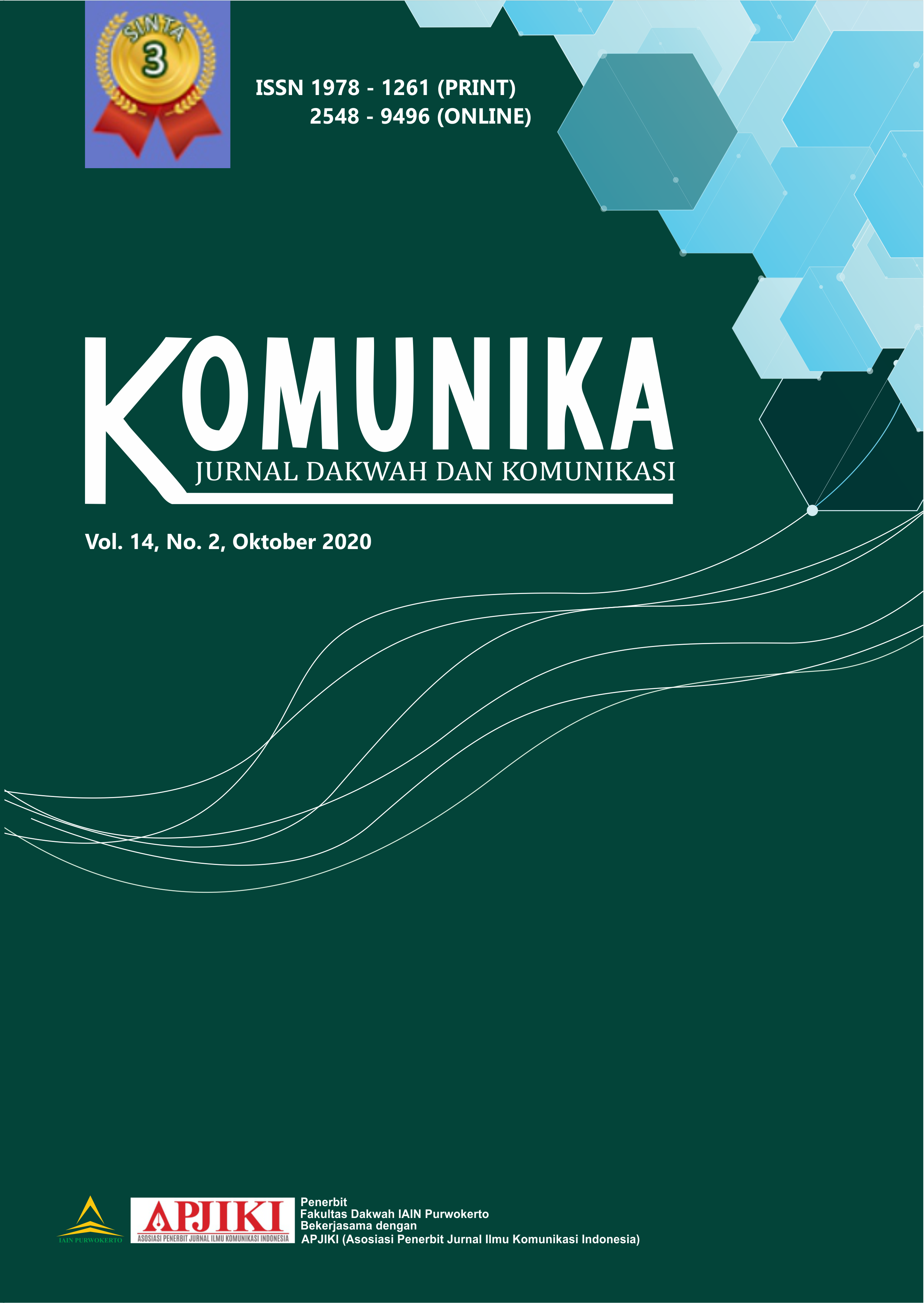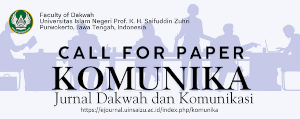Rehabilitasi Berbasis Pesantren bagi Penyalah Guna Narkotika sebagai Bentuk Perlindungan Hukum
DOI:
https://doi.org/10.24090/komunika.v14i2.3757Keywords:
rehabilitation, Islamic boarding school, abuse of narcotics, legal protectionAbstract
Illicit trafficking and narcotics abuse cause many victims and social problems. In implementing legal protection policies, the National Narcotics Agency (BNN) of Banyumas Regency undertakes rehabilitation efforts for narcotics abuse by collaborating with the Nurul Hikmah Islamic Boarding School in Cilongok. This study aims to analyze the form of legal protection for narcotics abusers in the Banyumas district, and the rehabilitation process for narcotics abusers based on Islamic boarding schools at Nurul Hikmah Islamic Boarding School, Cilongok Banyumas. This research is a type of empirical normative research. This study found that the BNN provides legal protection for narcotics abuse by placing them in institutions or rehabilitation centers. Based on the theory of victim protection, the steps and actions taken by the Banyumas Regency BNN are correct, namely separating the criminal offender (narcotics trafficker) from the victim (addicts and victims of narcotics abuse). In terms of carrying out rehabilitation, BNN Banyumas Regency has collaborated with the Nurul Hikmah Islamic Boarding School in Cilongok. The rehabilitation process at Nurul Hikmah Islamic Boarding School in Cilongok is an indicator that the government has carried out its obligations (in accordance with the UU No. 35/2009 about: Narcotics) in carrying out legal protection for victims of narcotics abuse in the form of pesantren-based social rehabilitation so that they can return to live a good life according to religious rules and principles.Downloads
Download data is not yet available.
References
Abdullah, M. A. (1995). Falsafah Kalam di Era Postmodernisme. Yogyakarta: Pustaka Pelajar.
Arief, B. N. (1998). Perlindungan Korban Kejahatan dalam Proses Peradilan Pidana. Jurnal Hukum Pidana dan Kriminologi, 1(1).
Ariyanti, V. (2009). Konsep Perlindungan Korban dalam Sistem Peradilan Pidana Nasional dan Sistem Hukum Pidana Islam. Al-Manahij: Jurnal Kajian Hukum Islam, 13(1), 33–48.
Badan Narkotika Nasional. (2018). Laporan Tahunan 2018.
Bergelson, V. (2009). Victims’ Rights and Victims’ Wrongs: Comparative Liability in Criminal Law. California: Stanford University Press.
Caputo, A. (2019). The Experience of Therapeutic Community: Emotional and Motivational Dynamics of People with Drug Addiction Following Rehabilitation. International Journal of Mental Health and Addiction, 17, 151–165. https://doi.org/10.1007/
s11469-018-0008-4
Dhofier, Z. (1994). Tradisi Pesantren, Studi tentang Pandangan Hidup Kyai. Jakarta: LP3ES.
Doerner, W. G., & Lab, S. P. (2012). Victimology (6th ed.). Amsterdam: Elsevier.
Gunarto, M. P. (2012). Terorisme dalam Prespektif Hukum Pidana dan Kriminologi. Yogyakarta: Genta Press.
Halin, S., Yenti, E., Ritonga, M., Asmaret, D., Ritonga, R., Mursal, & Rasyid, A. (2020). The Drug Addicts Rehabilitation: On Perspective of the Maqashid Shari’ah and Law Basic Principle. International Journal of Advanced Science and Technology, 29(4), 2837–2845.
Ilahi, M. T. (2014). Kiyai: Figur Elite Pesantren. Ibda: Jurnal Kebudayaan Islam, 12(2), 137–148.
Lomunno, G. (2002). An Integrated Behavioural and Cognitive Approach to the Re-habilitation of Drug Addicts in a Com¬munity Programme. In T. Scrimali & L. Grimaldi (Eds.), Cognitive Psychotherapy Toward a New Millennium (p. 233). Boston: Springer.
Mansur, D. M. A., & Gultom, E. (2008). Urgensi Perlindungan Korban Kejahatan: Antara Norma dan Realita. Jakarta: Raja Grafindo Persada.
Mastuhu. (2010). Dinamika Sistem Pendidikan Pesantren: Suatu kajian TentangUnsur dan Nilai Sistem Pendidikan Pesantren. Jakarta: INIS.
Muhadar, Abdullah, E., & Thamrin, H. (2009). Perlindungan Saksi dan Korban dalam Sistem Peradilan Pidana. Surabaya: Putra Media Nusantara.
Mulyadi, M. (2008). Criminal Policy: Pendekatan Integral Penal Policy dan Non-Penal Policy dalam Penanganan Kejahatan Kekerasan. Medan: Pustaka Bangsa Press.
Mustofa, M. (2016). Viktimologi Posmodern. Simposium Nasional dan Pelatihan Hukum Pidana dan Kriminologi Ke-III.
Nugroho, A. I., Riyanto, P., Lahinda, J., & Hidayat, S. H. (2020). Effectiveness of physical condition training on the fitness of drug abuse victims, BRSPP Yogyakarta. EnfermerÃa ClÃnica, 30(6), 63–66. https://doi.org/10.1016/j.enfcli.2020.06.015
Nuqul, F. L. (2008). Pesantren sebagai Bengkel Moral: Optimalisasi Sumber Daya Pesantren untuk Menanggulangi Kenakalan Remaja. Jurnal PsikoIslamika, 5(2), 163–182.
Pfaffendorf, J. (2019). Wayward Elites: From Social Reproduction to Social Restoration in a Therapeutic Boarding School. Social Psychology Quarterly, 82(2). https://doi.org/10.1177/0190272519831978
PP. Nurul Hikmah. (2018). Dokumen. Pondok Pesantren Nurul Hikmah.
Prasodjo, S. (1982). Profil Pesantren. Jakarta: LP3ES.
Rahardjo, S. (2000). Ilmu Hukum. Bandung: Citra Aditya Bakti.
Ramadhan, I., Kelia, B. A., & Wardani, I. Y. (2019). Assertiveness Training and Family Psycho-educational Therapies on Adole¬scents Mental Resilience in the Prevention of Drug use in Boarding Schools. EnfermerÃa ClÃnica, 29(2), 326–330. https://doi.org/10.1016/j.enfcli.2019.04.040
Redaktur. (2019, March). Banyumas Peringkat 3 Kasus Pengguna Narkoba Tertinggi di Jateng. Tribun Jateng.
Saelim, S., Thepthien, B., & Chucharoen, P. (2018). Decriminalization in Drug Policy: A Perspective from Policy Makers and Drug Users. The Proceedings of the 7th ICADA 2018, 150–169.
Schäfer, G. (2011). Family Functioning in Families with Alcohol and other Drug Addiction. Social Policy Journal of New Zealand, 37.
Sloas, L. B., & Atkin-Plunk, C. A. (2019). Perceptions of Balanced Justice and Rehabilitation for Drug Offenders. Criminal Justice Policy Review, 30(7). https://doi.org/10.1177/0887403418762532
Sulaiman, A. I., Noegroho, A., Suryanto, S., & Weningsih, S. (2019). The Holistic Rehabilitation Model for Drug Addicts, Phubbing and Conduct Disorder in Boarding Schools. Humanities and Social Science Research, 2(4). https://doi.org/doi.org/10.30560/hssr.v2n4p34
Waluyo, B. (2012). Viktimologi: Perlindungan Korban dan Saksi. Jakarta: Sinar Grafika.
Wibhawa, B., Apsari, N. C., Taftazani, B. M., Santoso, M. B., & Krisnani, H. (2019). The Management of Faith-Based Rehabilitation Organization: The Case of Pondok Inabah. Review of Integrative Business and Economics Research, 8(3), 93–101.
Wiyono, R. (2006). Pengadilan Hak Asasi Manusia di Indonesia. Jakarta: Kencana.
Yulia, R. (2010). Viktimologi Perlindungan Hukum terhadap Korban Kejahatan. Yogyakarta: Graha Ilmu.
Zikrie, I. (2018, September). Korban Narkoba Seharusnya Tidak Dijebloskan ke Penjara. CNN Indonesia.
Arief, B. N. (1998). Perlindungan Korban Kejahatan dalam Proses Peradilan Pidana. Jurnal Hukum Pidana dan Kriminologi, 1(1).
Ariyanti, V. (2009). Konsep Perlindungan Korban dalam Sistem Peradilan Pidana Nasional dan Sistem Hukum Pidana Islam. Al-Manahij: Jurnal Kajian Hukum Islam, 13(1), 33–48.
Badan Narkotika Nasional. (2018). Laporan Tahunan 2018.
Bergelson, V. (2009). Victims’ Rights and Victims’ Wrongs: Comparative Liability in Criminal Law. California: Stanford University Press.
Caputo, A. (2019). The Experience of Therapeutic Community: Emotional and Motivational Dynamics of People with Drug Addiction Following Rehabilitation. International Journal of Mental Health and Addiction, 17, 151–165. https://doi.org/10.1007/
s11469-018-0008-4
Dhofier, Z. (1994). Tradisi Pesantren, Studi tentang Pandangan Hidup Kyai. Jakarta: LP3ES.
Doerner, W. G., & Lab, S. P. (2012). Victimology (6th ed.). Amsterdam: Elsevier.
Gunarto, M. P. (2012). Terorisme dalam Prespektif Hukum Pidana dan Kriminologi. Yogyakarta: Genta Press.
Halin, S., Yenti, E., Ritonga, M., Asmaret, D., Ritonga, R., Mursal, & Rasyid, A. (2020). The Drug Addicts Rehabilitation: On Perspective of the Maqashid Shari’ah and Law Basic Principle. International Journal of Advanced Science and Technology, 29(4), 2837–2845.
Ilahi, M. T. (2014). Kiyai: Figur Elite Pesantren. Ibda: Jurnal Kebudayaan Islam, 12(2), 137–148.
Lomunno, G. (2002). An Integrated Behavioural and Cognitive Approach to the Re-habilitation of Drug Addicts in a Com¬munity Programme. In T. Scrimali & L. Grimaldi (Eds.), Cognitive Psychotherapy Toward a New Millennium (p. 233). Boston: Springer.
Mansur, D. M. A., & Gultom, E. (2008). Urgensi Perlindungan Korban Kejahatan: Antara Norma dan Realita. Jakarta: Raja Grafindo Persada.
Mastuhu. (2010). Dinamika Sistem Pendidikan Pesantren: Suatu kajian TentangUnsur dan Nilai Sistem Pendidikan Pesantren. Jakarta: INIS.
Muhadar, Abdullah, E., & Thamrin, H. (2009). Perlindungan Saksi dan Korban dalam Sistem Peradilan Pidana. Surabaya: Putra Media Nusantara.
Mulyadi, M. (2008). Criminal Policy: Pendekatan Integral Penal Policy dan Non-Penal Policy dalam Penanganan Kejahatan Kekerasan. Medan: Pustaka Bangsa Press.
Mustofa, M. (2016). Viktimologi Posmodern. Simposium Nasional dan Pelatihan Hukum Pidana dan Kriminologi Ke-III.
Nugroho, A. I., Riyanto, P., Lahinda, J., & Hidayat, S. H. (2020). Effectiveness of physical condition training on the fitness of drug abuse victims, BRSPP Yogyakarta. EnfermerÃa ClÃnica, 30(6), 63–66. https://doi.org/10.1016/j.enfcli.2020.06.015
Nuqul, F. L. (2008). Pesantren sebagai Bengkel Moral: Optimalisasi Sumber Daya Pesantren untuk Menanggulangi Kenakalan Remaja. Jurnal PsikoIslamika, 5(2), 163–182.
Pfaffendorf, J. (2019). Wayward Elites: From Social Reproduction to Social Restoration in a Therapeutic Boarding School. Social Psychology Quarterly, 82(2). https://doi.org/10.1177/0190272519831978
PP. Nurul Hikmah. (2018). Dokumen. Pondok Pesantren Nurul Hikmah.
Prasodjo, S. (1982). Profil Pesantren. Jakarta: LP3ES.
Rahardjo, S. (2000). Ilmu Hukum. Bandung: Citra Aditya Bakti.
Ramadhan, I., Kelia, B. A., & Wardani, I. Y. (2019). Assertiveness Training and Family Psycho-educational Therapies on Adole¬scents Mental Resilience in the Prevention of Drug use in Boarding Schools. EnfermerÃa ClÃnica, 29(2), 326–330. https://doi.org/10.1016/j.enfcli.2019.04.040
Redaktur. (2019, March). Banyumas Peringkat 3 Kasus Pengguna Narkoba Tertinggi di Jateng. Tribun Jateng.
Saelim, S., Thepthien, B., & Chucharoen, P. (2018). Decriminalization in Drug Policy: A Perspective from Policy Makers and Drug Users. The Proceedings of the 7th ICADA 2018, 150–169.
Schäfer, G. (2011). Family Functioning in Families with Alcohol and other Drug Addiction. Social Policy Journal of New Zealand, 37.
Sloas, L. B., & Atkin-Plunk, C. A. (2019). Perceptions of Balanced Justice and Rehabilitation for Drug Offenders. Criminal Justice Policy Review, 30(7). https://doi.org/10.1177/0887403418762532
Sulaiman, A. I., Noegroho, A., Suryanto, S., & Weningsih, S. (2019). The Holistic Rehabilitation Model for Drug Addicts, Phubbing and Conduct Disorder in Boarding Schools. Humanities and Social Science Research, 2(4). https://doi.org/doi.org/10.30560/hssr.v2n4p34
Waluyo, B. (2012). Viktimologi: Perlindungan Korban dan Saksi. Jakarta: Sinar Grafika.
Wibhawa, B., Apsari, N. C., Taftazani, B. M., Santoso, M. B., & Krisnani, H. (2019). The Management of Faith-Based Rehabilitation Organization: The Case of Pondok Inabah. Review of Integrative Business and Economics Research, 8(3), 93–101.
Wiyono, R. (2006). Pengadilan Hak Asasi Manusia di Indonesia. Jakarta: Kencana.
Yulia, R. (2010). Viktimologi Perlindungan Hukum terhadap Korban Kejahatan. Yogyakarta: Graha Ilmu.
Zikrie, I. (2018, September). Korban Narkoba Seharusnya Tidak Dijebloskan ke Penjara. CNN Indonesia.
Downloads
Published
2020-10-01
Issue
Section
Articles
License
Authors who publish with this journal agree to the following terms:
- Authors retain copyright and grant the journal right of first publication with the work simultaneously licensed under a Creative Commons Attribution-ShareAlike 4.0 International License that allows others to share the work with an acknowledgement of the work's authorship and initial publication in this journal.
- Authors are able to enter into separate, additional contractual arrangements for the non-exclusive distribution of the journal's published version of the work (e.g., post it to an institutional repository or publish it in a book), with an acknowledgement of its initial publication in this journal.
- Authors are permitted and encouraged to post their work online (e.g., in institutional repositories or on their website) prior to and during the submission process, as it can lead to productive exchanges, as well as earlier and greater citation of published work (See The Effect of Open Access).

























